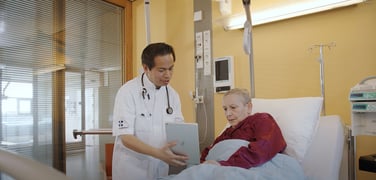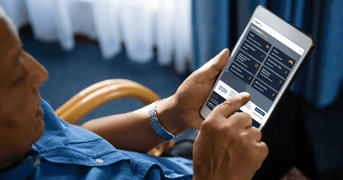How to Deliver Patient-Centred Care With the Help of Technology
6 minute read | 31/07/2020

At its core, healthcare is about the patients — technology is simply an enabler. There’s so much more to offer than just internet access when implementing health tech innovations in your practice or hospital.
Implementing the right technology unlocks communication avenues that have the potential to save costs, improve patient engagement, minimise manual processes and give valuable time back to staff. Learn more about how patient-centred care is made easier by leveraging tech.
- Delivering accessible patient entertainment
- Providing timely education
- Extra resources to those who need It most
- Giving the power back to the patient
- Take inspiration from Trusts' pioneering tech
Delivering accessible patient entertainment
NHS App registrations increased from two million people in 2021 to 30 million in 2023, showing that modern-day patients are better equipped with technology now more than ever.
The vast majority of people have a smartphone, expects WiFi and is used to digital technology making our lives easier.
It’s easy to leverage this familiarity with tech to avoid frustration and possible isolation for those admitted, utilising intelligent patient-centred care systems to adapt to their evolving needs. These systems improve both efficiency on the ward and overall patient satisfaction when paired with reliable WiFi, and can be used bedside and on personal devices.
While the existing Hospedia Bedside Units provide convenient entertainment on a wall mounted arm next to patients beds, many of the entertainment options come with a charge. They also have limited functionality, being 20 years old, and are well overdue for an upgrade. They are not rendered completely useless however, learn more about the Hospedia hospital entertainment system in this blog.
The latest technology enables patients to use their own devices or bedside displays that utilise WiFi. They’ll have access to a broader range of entertainment including on demand services such as Netflix, Disney Plus & BBC iPlayer, puzle games, films & more. They will all be free of charge and available for patients to enjoy, keeping them entertained while hospital staff concentrate on providing care.
This provides more entertainment during their hospital stay and boosts their overall experience. It’s essential in paediatric wards and can help to relax both unwell and visiting children.
Providing timely education
With patient engagement technology, users can access a library of educational information. This information can be tailored to suit the ward the patient is in. For example, patients on a cardiology ward can learn about heart disease and how to prevent it.
Previous systems have allowed patients to explore the NHS’s content library, but it’s been challenging to find and access. Patients can now easily browse helpful clinical information on smoking, diabetes and mental health, helping them make informed choices.
When speaking to patients, it can be difficult for doctors to convey the patient’s issue precisely. However, with the available educational content, they can refer to helpful guides and videos to help the patient understand at their own pace.
Extra resources to those who need it most
These systems empower patients by giving them educational resources, details on their care and entertainment services. They also let patients communicate requests instead of always requiring a nurse. This means resources can be allocated to those who need it most.
Over 70% of RCAs from the NHS mention communication as a contributing factor. Therefore, patients, nurses, doctors and staff need constant communication to create a system that operates as smoothly as possible.
As every patient will have access to the network, you can give a better, more bespoke service which puts them at the centre. With the proper infrastructure, patient communication can evolve to foster more supportive patient-doctor interactions.
Giving the power back to the patient
Empowering patients with modern solutions in healthcare is essential. Giving them an active role and access to self-care has the potential to shape their entire hospital experience.
An example is how technology and sophisticated systems can be integrated with a Trust’s meal ordering provider, so patients can order what they want at the touch of a button. This means staff no longer have to visit each ward, potentially having to ask everybody what meal they’d like.
Plus, as the system links to patients and their ward numbers, the meals can be redirected if they move or cancelled if discharged, reducing waste and saving costs.
Patients can also easily read electronic menus and know the ingredients before ordering. This helps the NHS as it reduces food wastage, especially since the NHS reported a £230m annual cost of hospital food waste in 2020.
Hospitals also need comprehensive feedback from patients to improve their care. Receiving feedback is a challenge, with letters needing to be sent off and patients simply forgetting. Intelligent systems can prompt them at critical points of their stay, getting the necessary valuable insights to shape future patient-centric care decisions.
Take inspiration from Trusts' pioneering tech
Patient entertainment systems aren't just for patients, although their efficiencies allow us to make improvements for them.
While part of the aim of a patient entertainment service is to provide a better experience which leads to patient happiness, it also needs to benefit the hospital so it can continue to do so.
The main goal is to streamline work, optimise systems, improve patient outcomes, reduce human error, lower costs, minimise miscommunication and ensure smoother handoffs.
Those who have already implemented such systems are proving to be an excellent investment into the well-being of everyone at the hospital. Bedfordshire Hospital and Dorset County Hospital are some of the Trust's pioneering technologies that focus on the patient experience - plenty of others have paved the way.
Many hospitals are plagued by poor cellular signals, making keeping in touch with friends and family challenging. The thought of being unable to contact those most important to us is unsettling.
Find the right patient-centred care solution for you
If you’re interested in discovering how patient entertainment systems have evolved and what modern platforms can do for the NHS, download our product brochure by clicking the button below.
About the author
Rebecca O'Donovan
Becky is the Marketing Director at SPARK TSL, of whom she has worked for since 2012. She is responsible for high-level marketing strategy focusing on lead generation and aiding the vision of the business to ensure business growth.
More articles by the author
Related articles
 The SPARK Solution
The SPARK Solution
Clinical Benefits of Hospedia Bedside Units and SPARK® Media
Hospedia Bedside Unit Clinical Benefits for Patients
 Company News
Company News
Introducing SPARK Fusion, the Hospedia Upgrade
Understanding Hospedia, The Current Bedside Entertainment Solution If you’ve been to hospital, then you’ve ...
 Healthcare Industry
Healthcare Industry


